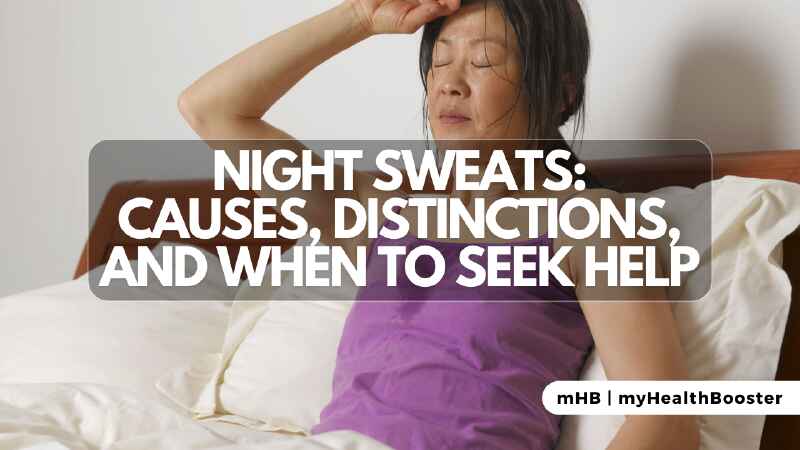Night sweats are a common concern reported by individuals in primary care settings. While occasional sweating during sleep due to environmental factors is normal, night sweats that stem from underlying medical causes can be more severe. This article explores the distinctions between ordinary night sweats and those triggered by medical conditions, potential causes across different demographics, and when individuals should seek medical attention.
Defining Night Sweats
- Night sweats involve excessive sweating during sleep but are not solely attributed to an overheated environment or excessive clothing.
- True night sweats are severe hot flashes occurring at night, leading to drenched sleepwear and sheets.
Night Sweats vs. Hot Flashes vs. Night Terrors
- Hot flashes and night sweats, although often used interchangeably, differ; hot flashes involve sudden, intense warmth.
- Night terrors, distinct from night sweats, entail waking up in a state of fear, causing anxiety and potential sweating.
Causes Across Demographics
- Various medical conditions contribute to night sweats, including perimenopause, hormone disorders, infections, cancers, and certain medications.
- Idiopathic hyperhidrosis, a condition of chronic excessive sweating without a clear cause, is another potential contributor.
Symptoms Associated with Night Sweats
- Depending on the underlying cause, additional symptoms may accompany night sweats, such as shaking, chills, unexplained weight loss, or fever.
- Menopausal night sweats may coincide with vaginal dryness, hot flashes, and mood changes.
Diagnosis and Treatment
- Night sweats can be diagnosed and treated by various healthcare providers, including internists, family practice specialists, gynecologists, endocrinologists, neurologists, infectious disease specialists, or oncologists.
- Treatment approaches vary based on the underlying cause and may include lifestyle modifications, cognitive behavioral therapy (CBT), and medications.
Lifestyle Modifications and CBT
- Lifestyle modifications, such as avoiding caffeine and alcohol, maintaining a healthy weight, and using relaxation techniques, may alleviate night sweats.
- Cognitive behavioral therapy (CBT) has shown efficacy in reducing the frequency of night sweats, especially when combined with other approaches.
Medications and Other Interventions
- Medications, including antidepressants, may cause night sweats, and adjusting medications or doses can be considered.
- Treating underlying conditions, such as infections or hormone disorders, may help manage night sweats.
Outcome and When to Seek Help
- Night sweats can impact sleep and quality of life but are often harmless. Cooling the sleep environment may provide relief.
- Seeking medical attention is advised when night sweats occur regularly, disrupt sleep, or are accompanied by fever, chills, unintended weight loss, or other concerning symptoms.
Conclusion
While night sweats are a common phenomenon, distinguishing between ordinary occurrences and those related to underlying health issues is crucial. Individuals experiencing persistent or disruptive night sweats, especially when accompanied by additional symptoms, should consult healthcare providers for an accurate diagnosis and appropriate management. By understanding the causes and seeking timely medical attention, individuals can enhance their overall well-being and sleep quality.
References
- Mold, JW, Mathew, MK, Belgore, S, DeHaven, M. Prevalence of night sweats in primary care patients: an OKPRN and TAFP-Net collaborative study. J Fam Pract; 51:452.
- Cleveland Clinic. Night Sweats and Women’s Health.
- Suni E. Common Causes of Night Sweats and How to Fix Them. Sleep Foundation.
- American Osteopathic Association: “Excessive sweating keeping you up at night? Know when it’s time to see your doctor.”
- Cleveland Clinic: “Frustrated By Night Sweats While You’re Sleeping?”
- National Health Service: “Night sweats.”
- Sleep Foundation: “Common Causes of Night Sweats and How to Fix Them.”
